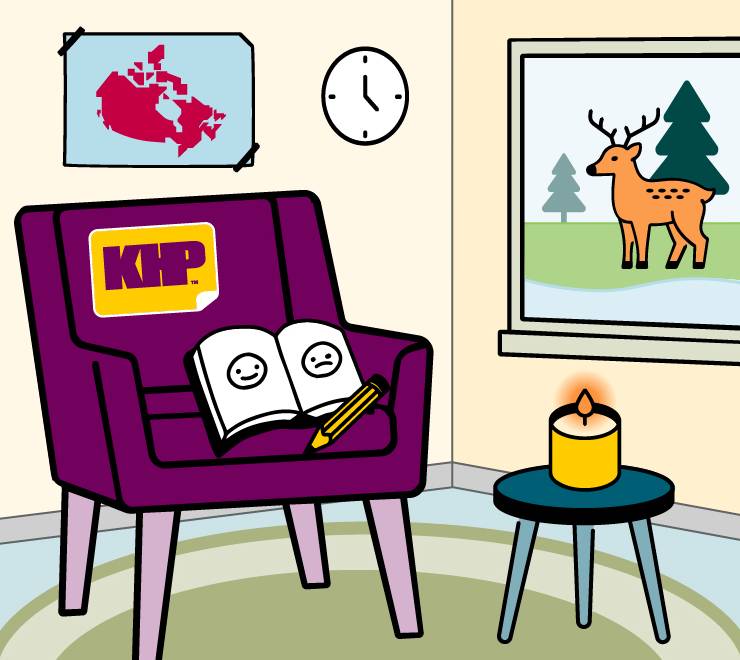According to Statistics Canada, newcomers make up about 23% of the population in Canada (and growing!). Newcomers often face unique opportunities, changes and challenges when they start living in a new country. In this story, Kids Help Phone shares ways newcomers can cope with common settlement issues and ease their transition to life in Canada.
You can tap on the video below to view an interpretation of this story in American Sign Language (ASL).
If you’re new to Canada, you may have questions about what your life might be like. It may be helpful to remember there are people and places available to support you. Next, you can discover definitions of some common settlement issues newcomers may experience. Then, you can explore some ways you can work through these issues in your new country.
Common issues newcomers may experience as they settle in Canada include:
- Language barriers: Not knowing or being fluent in the local language (e.g. the common sign language, etc.) can affect all areas of life in your new country. It can also impact your ability to access the support services you deserve in a language you know how to use.
- Culture shock: Culture shock happens when you don’t feel like you’re connecting with a new place. It can lead to feeling isolated, lonely, overwhelmed, etc.
- Acculturation stress: Acculturation stress happens when you’re struggling with conflicting messages. For example, messages from your country of origin — and messages from your new country — about how to act or what’s important. Some newcomers may also have the added pressure of helping their families adjust.
- Discrimination: Prejudice and discrimination can be a factor for many newcomers. Discrimination can also affect all areas of life. It can lead to things like bullying, assault and harassment. 2SLGBTQ+ newcomers may experience specific challenges both in their country of origin and in their new country (e.g. a lack of acceptance for their sexual orientation, etc.). Racialized newcomers may experience things other newcomers may not (e.g. discrimination due to skin colour, etc.).
- Housing, job and money struggles: Finding a place to live and a steady source of income can be difficult for some newcomers and their families. Housing, school and other costs may also be more expensive than in other countries.
- Family life: Balancing roles, beliefs, values, practices, etc. from your country of origin with those in your new country can create conflict between youth and their families. This may impact who your friends are, who you date, how you dress, where you spend your time, etc.
- Building relationships: Starting out in a new country often means meeting new people. Making friends and building relationships can take time. It may come easier to some people than others, too.
- School struggles: Attending a new school can be tough. You may be coping with an unfamiliar setting, a language barrier, a lack of accommodations for your needs and different expectations. You may also have to catch up from time missed during your move to a new country.
- Mental health struggles: Some (not all) newcomers may find it’s easier to access health services in a new country. This can have a positive effect on your mental health. However, settlement issues can increase newcomers’ risk for mental disorders. Since there can be stigma about mental health in some cultures, it can be harder for some newcomers to ask for and get help. If you’re struggling or notice changes in your mood, thoughts or actions, you might consider connecting with a safe adult for support.
And here are some coping strategies newcomers can try to manage common settlement issues:
- take a course in the language that’s used in your new location (e.g. the sign language used in your community, etc.)
- acknowledge any feelings of grief / loss over what you left behind in your country of origin
- connect with a settlement agency for support / help with newcomer services (you can search Kids Help Phone’s Resources Around Me directory for supports nearest you)
- journal your experiences and take note of your hopes, dreams, goals, etc. for life in your new country
- write down all of the things you enjoy about your new country and post them where you can access them often (you can share them with your family / community, too!)
- take time each day for self-care and doing things you enjoy (e.g. hobbies you’ve always loved or new ones you’ve found in your new country, etc.)
- boost your self-esteem by finding your strengths and building on them (you could make a collage of all of the things you’re skilled at and enjoy, for example)
- take care of your physical health in ways that work for / are accessible to you
- seek out ways to continue traditions from your country of origin / ways to get involved in your new community
- empower yourself by noticing things you can change / control in your life (as opposed to things you can’t)
- search for role models from your country of origin / culture / community / etc.
- connect with other young people online through the Peer-to-Peer Community at Kids Help Phone
- join a community organization with other people from your country of origin / culture
Making a life for yourself in a new country can come with many emotions and settlement issues. If you’re struggling with your transition to Canada, you can connect with someone you trust. For free, private, 24/7 support with anything on your mind, you can contact Kids Help Phone.
















